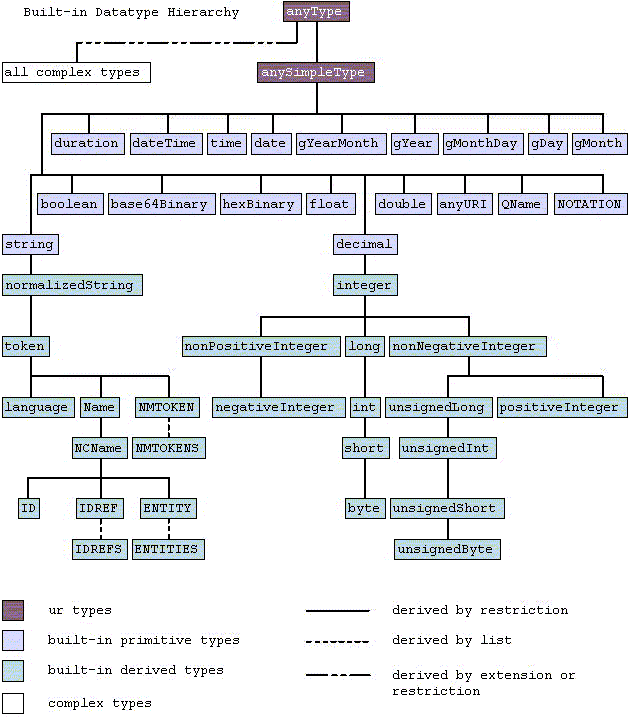sca-assembly message
[Date Prev]
| [Thread Prev]
| [Thread Next]
| [Date Next]
--
[Date Index]
| [Thread Index]
| [List Home]
Subject: Re: [sca-assembly] Issue 14 - more on XML Schema....
- From: Mike Edwards <mike_edwards@uk.ibm.com>
- To: "OASIS Assembly" <sca-assembly@lists.oasis-open.org>
- Date: Thu, 10 Apr 2008 11:08:08 +0100
Ashok,
I find the statement "the derivation
of simple types from xs:anyType is not clearly
spelled out" somewhat surprising.
The following (which will probably appear
as an attachment in most email systems) is
from the XML Schema Spec, Part 2:
3 Built-in datatypes

This diagram clearly shows that "anyType"
is the root of the datatype hierarchy, containing both all
simple Types and all complex Types.
The following statement about anyType
is in Part 1 of the XML Schema spec, section 3.4.7:
"The mixed
content specification together with the lax wildcard and attribute
specification produce the
defining property for the ·ur-type
definition·, namely that every type definition
is (eventually) a restriction
of the ·ur-type
definition·: its permissions and requirements
are (nearly) the least restrictive possible. "
...note the statement "every type definition is a
restriction" ...of the anyType, since this section is a
definition of anyType.
So, I contend that an element defined in the SCA schema
like:
<xs:element name="value" type="xs:anyType"/>
...can literally have any content, including simple types,
complex types and mixed content.
...and that an instance of value can then restrict the
type using the xs:type attribute:
<value xs:type="ns:foo"> ...whatever type
foo allows... </value>
since the type ns:foo is necessarily a restriction of
anyType, by definition.
...but I'm no XML expert and my brain hurts now...
Yours, Mike.
Strategist - Emerging Technologies, SCA & SDO.
Co Chair OASIS SCA Assembly TC.
IBM Hursley Park, Mail Point 146, Winchester, SO21 2JN, Great Britain.
Phone & FAX: +44-1962-818014 Mobile: +44-7802-467431
Email: mike_edwards@uk.ibm.com
| ashok malhotra <ashok.malhotra@oracle.com>
09/04/2008 13:38
|
Please respond to
ashok.malhotra@oracle.com |
|
|
To
| Anish Karmarkar <Anish.Karmarkar@oracle.com>
|
|
cc
| "'OASIS Assembly'" <sca-assembly@lists.oasis-open.org>
|
|
Subject
| Re: [sca-assembly] Issue 14 |
|
Hi Anish:
If you are using a Schema 1.0 processor you need to use xs:anySimpleType
instead of xs:anyAtomicType.
In theory, you can define <value> as xs:anyType and then use xsi:type
to
specify a complexType or a simpleType.
The problem is that the derivation of simple types from xs:anyType is
not clearly spelled out and so some processors
may not accept it. My proposal was conservative. If we find
that most
Schema processors accept it this design then
let's go for it.
In your solution below, you had to specify a simpleType with content
that is a restriction of xs:string or a complexType
with simple content of type xs:string. If you want to go in this
direction you would have to define types for each Schema datatype.
I was hoping to avoid that.
Ashok
Anish Karmarkar wrote:
> Ashok,
>
> I didn't see a xs:anyAtomicType at
> http://www.w3.org/TR/xmlschema-2/#built-in-datatypes
> Is this something that is in the next version of schema?
>
> I was trying to find out about the restriction that you are talking
> about in schema. I couldn't. Can you send me a pointer? Thx.
>
> I tried the following using XMLSpy 2006 sp2 --
>
> XSD:
>
> <?xml version="1.0" encoding="UTF-8"?>
> <xs:schema xmlns:xs="http://www.w3.org/2001/XMLSchema"
> targetNamespace="http://example.org/test"
> elementFormDefault="qualified" attributeFormDefault="unqualified">
> <xs:element name="value" type="xs:anyType"/>
> <xs:simpleType name="st">
> <xs:restriction base="xs:string"></xs:restriction>
> </xs:simpleType>
> <xs:complexType name="ct">
> <xs:simpleContent>
> <xs:extension base="xs:string">
> <xs:attribute
name="attr" type="xs:string"/>
> </xs:extension>
> </xs:simpleContent>
> </xs:complexType>
> </xs:schema>
>
> XML instance with simple type:
>
> <?xml version="1.0" encoding="UTF-8"?>
> <value xmlns="http://example.org/test"
> xmlns:xsi="http://www.w3.org/2001/XMLSchema-instance"
> xsi:schemaLocation="http://example.org/test
>
assembly_issue_14.xsd"
> xsi:type="st">
> some string value
> </value>
>
> XML instance with complex type:
>
> <?xml version="1.0" encoding="UTF-8"?>
> <value xmlns="http://example.org/test"
> xmlns:xsi="http://www.w3.org/2001/XMLSchema-instance"
> xsi:schemaLocation="http://example.org/test
>
assembly_issue_14.xsd"
> xsi:type="ct"
> attr="some attr value">
> some element value
> </value>
>
> It worked the way I was hoping to work. Validating both the XML
> documents above and not validating XML documents that do not conform
> to the declared xsi:type value.
>
> -Anish
> --
>
> ashok malhotra wrote:
>> Here is a proposal that will work.
>>
>> Define an element called <ComplexValue> that has Schema
type xs:anyType.
>> Use xsi:Type to indicate the precise complex type used.
>>
>> Define an element called <SimpleValue> that has Schema type
>> xs:anyAtomicType.
>> Use xsi:Type to indicate the precise type used.
>>
>> I'll talk with my Schema colleagues to see if we can get away
with a
>> single value type.
--
All the best, Ashok
---------------------------------------------------------------------
To unsubscribe from this mail list, you must leave the OASIS TC that
generates this mail. You may a link to this group and all your TCs
in OASIS
at:
https://www.oasis-open.org/apps/org/workgroup/portal/my_workgroups.php
Unless stated otherwise above:
IBM United Kingdom Limited - Registered in England and Wales with number
741598.
Registered office: PO Box 41, North Harbour, Portsmouth, Hampshire PO6
3AU
[Date Prev]
| [Thread Prev]
| [Thread Next]
| [Date Next]
--
[Date Index]
| [Thread Index]
| [List Home]
